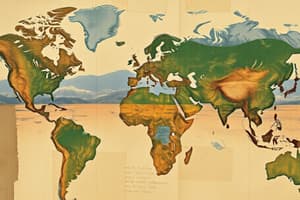Podcast
Questions and Answers
Which aspect of geography focuses on understanding the Earth's landforms, water bodies, climate zones, and ecosystems?
Which aspect of geography focuses on understanding the Earth's landforms, water bodies, climate zones, and ecosystems?
- Economic Geography
- Physical Geography (correct)
- Cultural Geography
- Human Geography
What aspect of geography deals with human migration, trade, cultural exchanges, and political decisions?
What aspect of geography deals with human migration, trade, cultural exchanges, and political decisions?
- Regional Geography
- Human Geography (correct)
- Historical Geography
- Physical Geography
Why is it important to study physical geography?
Why is it important to study physical geography?
- To understand the impact of human activities on the environment
- To analyze cultural adaptation techniques
- To explain why certain regions have specific weather conditions (correct)
- To study political influences on human settlements
Which geographic aspect involves the study of human adaptation to different biomes and habitats?
Which geographic aspect involves the study of human adaptation to different biomes and habitats?
In which type of geography do indigenous communities relying heavily on local plant life for survival fit best?
In which type of geography do indigenous communities relying heavily on local plant life for survival fit best?
Why is geography considered a key discipline for understanding our world?
Why is geography considered a key discipline for understanding our world?
What factors does climate define?
What factors does climate define?
Which of the following is NOT a common climate zone mentioned in the text?
Which of the following is NOT a common climate zone mentioned in the text?
What technological advancement has enabled the creation of digital maps and visualizations for modern planning processes?
What technological advancement has enabled the creation of digital maps and visualizations for modern planning processes?
What does cartography refer to?
What does cartography refer to?
How do Geographical Information Systems (GIS) contribute to modern-day decision-making processes?
How do Geographical Information Systems (GIS) contribute to modern-day decision-making processes?
What insights does geography offer according to the text?
What insights does geography offer according to the text?
Flashcards are hidden until you start studying
Study Notes
Exploring Our World's Geographic Landscape
Geography is more than just map reading; it's the study of our planet's physical features, landscapes, human settlement patterns, cultures, climates, and natural resources. As a field, geography helps us make sense of where we live on Earth and how various forces have shaped our environment over time. Let's dive into some key aspects of this fascinating discipline.
Physical Geography
Physical geography revolves around understanding the Earth's landforms, water bodies, climate zones, and ecosystems. From towering mountain ranges like the Himalayas and Andes to vast river systems such as Amazon River and Mississippi River, nature has sculpted intriguing landscapes across our globe. Understanding these formations can help explain why certain regions experience specific weather conditions, while others support diverse biodiversity.
Human Geography
Humans don't only shape their environments—they also influence each other through migration, trade, culture exchanges, and political decisions. Humans adapt to different biomes and habitats, creating unique cultural identities based on their locations. For instance, the Inuit people thrive in arctic conditions due to millennia of adaptation techniques passed down from generation to generation. Similarly, tropical rainforests nurture culturally distinct indigenous communities who rely heavily on local plant life for survival.
Climate Zones
Climate defines the temperature, precipitation, and humidity levels experienced by humans living within its boundaries. These factors affect everything from agriculture to daily activities and even dictate what flora and fauna inhabit particular areas. Some common climate zones you may encounter during your studies include desert, grasslands, tundra, temperate forest, Mediterranean, oceanic, semi-arid steppe, continental, and alpine climatic zones. Each one comes with its own set of challenges and opportunities when determining suitable places for human habitation.
Cartography and GIS
Cartography refers to the art and science of making maps. We depend upon geographers' skilled representations of terrain, population distribution, economic activity, and environmental stressors to understand our world better. Advances in computer technology have led to the development of Geographical Information Systems (GIS), which allows users to analyze spatial data to create digital maps and visualizations essential for modern day planning, management, and decision-making processes.
In summary, geography teaches us about our past, present, and future, helping to connect seemingly disparate elements related to humanity and our environment. It offers insights into global issues such as urbanization, climate change, resource allocation, and regional conflicts, providing valuable tools for addressing these pressing concerns facing our rapidly changing world.
Studying That Suits You
Use AI to generate personalized quizzes and flashcards to suit your learning preferences.




